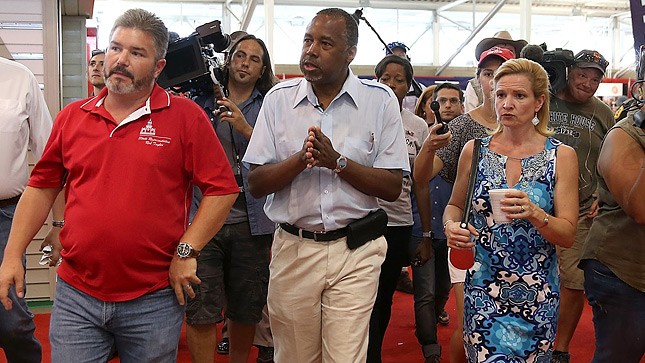
Ben Carson’s presidential campaign says it raised $3.5 million in grassroots donations in just the first week of September, more than half of what it says it raised for the entire month of August.
But despite the big money and 70,000 new donors added since the GOP’s first debate on Fox News on Aug. 6, Carson’s campaign and its supporting super-PAC lack big-money donors like those supporting the more mainstream candidates.
Outsider candidates Carson, Carly Fiorina and Donald Trump are winning over voters in polling, but only one, Trump, is financing his campaign largely through his own wealth.
If billionaire donors don’t come to the aid of the other two, and they have to rely on small donors, can they run viable primary campaigns in the era of big money?
The campaign of Carson, who is polling at a strong second place among the 17 GOP candidates, could test the question.
Stuart Stevens, chief strategist for 2012 GOP presidential nominee Mitt Romney, believes so. “If I had to have a choice at this stage I would rather have a small-donor base than a large-donor base,” he said.
Stevens said a foundation of donors giving smaller amounts — Carson’s campaign claims to have 275,000 — is the hardest thing to acquire and takes time, whereas early wins in Iowa or New Hampshire could bring in large checks “overnight.”
The great benefit of small donors is that unlike donors who contribute the legal maximum of $2,700 in one hit, they can be tapped again for additional donations.
Joe Trippi, who ran Howard Dean’s insurgent 2004 campaign for the Democratic nomination, said a candidate such as Carson can “absolutely” win the GOP presidential nomination without the early establishment money his rivals have.
“I actually think that somebody — that doesn’t necessarily mean that it will be Ben Carson — will overwhelm the super-PACs at some point,” said Trippi, who during the Dean campaign helped design the blueprint for modern small-donor fundraising over the Internet.
Carson’s campaign is not rejecting big money — it just hasn’t had much of it yet.
The two main pro-Carson super-PACs reported a combined $4 million in their half-year reports, which pales in comparison to the tens of millions raised by Ted Cruz, Scott Walker and Marco Rubio and the $100 million-plus raised by Jeb Bush.
Carson communications director Doug Watts said the campaign is seeking bigger donors and that he expects larger checks to flow in as wealthier conservatives recognize Carson as a viable candidate.
Until then, the campaign is focused on the smaller donors. Carson’s small-dollar base is unique in the current Republican field and only exceeded by Democratic candidate Bernie Sanders.
Despite Carson saying very little onstage during the Republican debate in August, his advisers say he made a big impression with his soft tone and powerful closing statement. Campaign officials Watts, Ken Dawson and Mike Murray all said the money has been pouring in at an unprecedented rate since then.
“I’ve never seen anything like it [on the GOP side],” said Murray, who is running direct mail fundraising for Carson’s campaign and has worked in conservative politics for 20 years, including fundraising for Newt Gingrich’s 2012 presidential campaign.
“It looks a bit more like Obama than like something you would see on the GOP side,” added Murray, who said that more young people are sending small donations to the Carson campaign via Facebook than would typically occur in a conservative candidate’s campaign.
Since the debate, Carson’s campaign says it has pulled in more than $9.5 million in contributions, almost as much as it collected from March 3 to June 30. That increase equates to about $297,000 in donations each day since the debate, compared with a daily donation rate of about $88,000 from March to June.
Carson’s money operation is the polar opposite of Bush’s. Bush has more than $100 million in his supporting super-PAC, but of the $11 million his campaign has raised, less than 3 percent came in donations of less than $200. Democratic front-runner Hillary Clinton’s campaign raised less than 17 percent of its donations in small dollar increments, and her average donation is $145.
Carson’s average is $50, and about 70 percent of Carson’s donations arrived in amounts of less than $200. The only candidate who beats him on small-dollar donors is Sanders, who unlike every other candidate in the race, rejects super-PACs. He has received 76 percent of his $14 million in donations in amounts of $200 or less.
Whether Carson finds his mega-donor is an open question, but at least one billionaire conservative believes he shouldn’t be counted out regardless of what happens.
Asked whether Carson could win purely on the back of small donations, Minnesota-based media mogul Stanley Hubbard, who is supporting Scott Walker, replied, “Well I will say this to you: If somebody can get enough public support via the media, then I don’t care how much money you have or don’t have. You can get the nomination.”
- Publish my comments...
- 0 Comments
